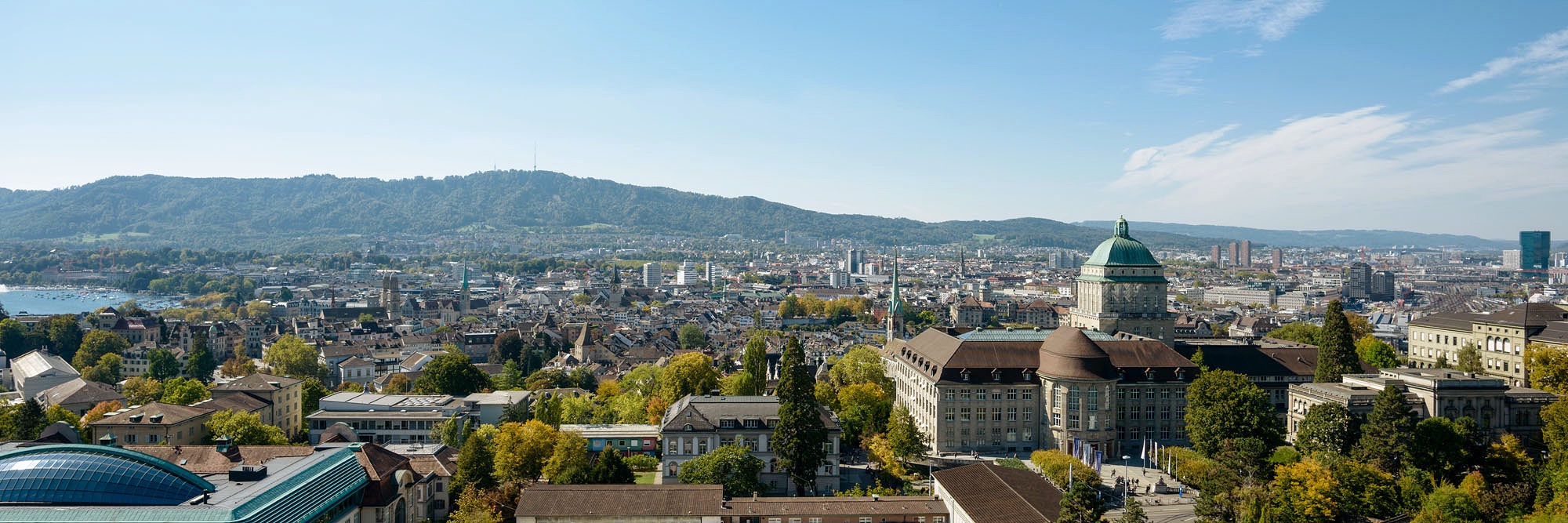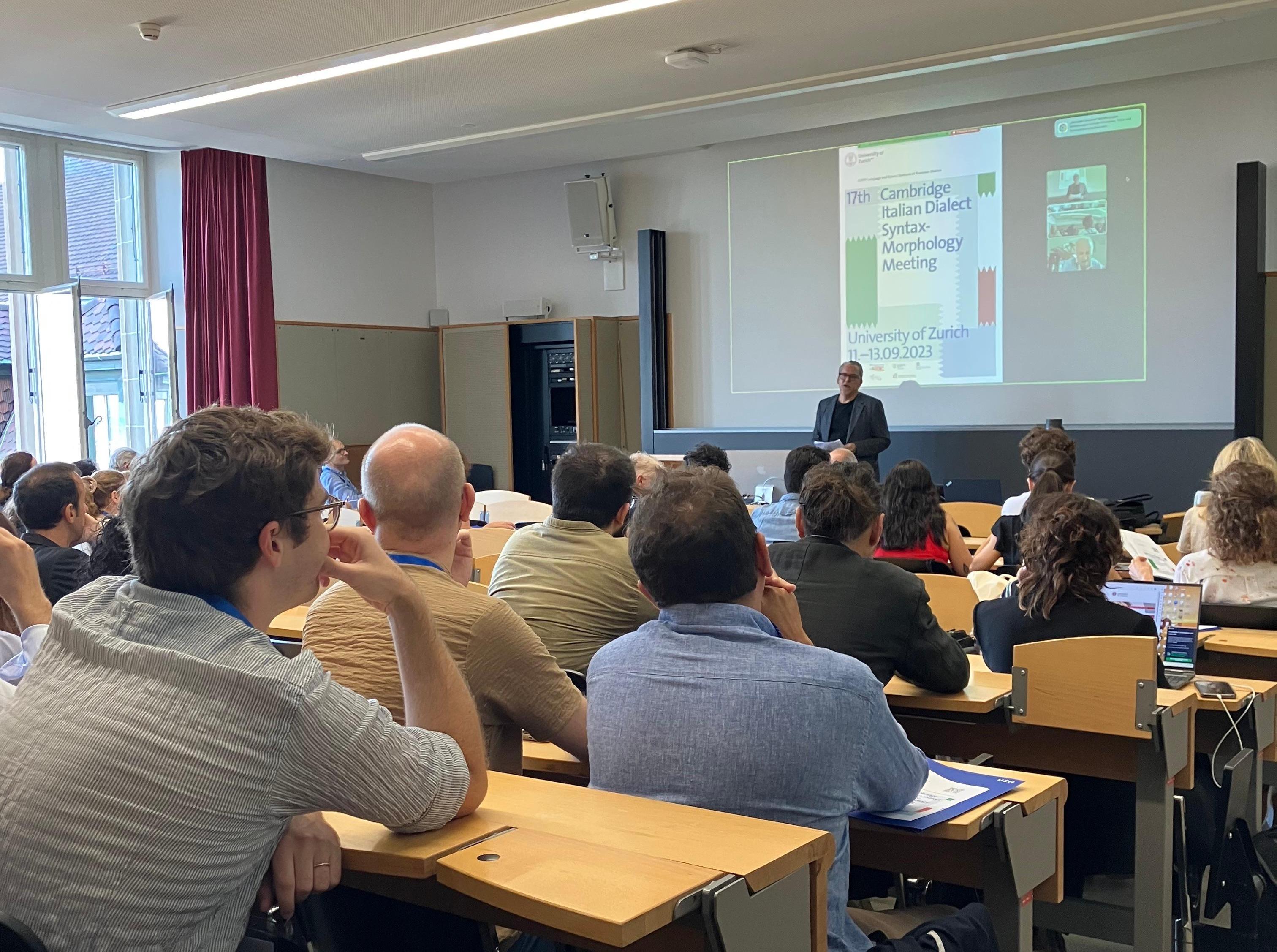Navigation auf uzh.ch
Navigation auf uzh.ch

Il convegno intende offrire un’opportunità di discussione e di interazione tra chi si occupi di sintassi e/o morfologia dei dialetti d’Italia (varietà non italo-romanze incluse), incoraggiando tutti gli approcci – sia sincronici che diacronici, sia descrittivi che teorici e formali – allo studio dei dialetti e/o delle lingue regionali d’Italia.
The meeting aims to bring together scholars working on any aspect of the syntax and/or morphology of the dialects of Italy (including non-Italo-Romance varieties) and encourages all approaches – whether synchronic or diachronic, descriptive or theoretical (all frameworks) – to the regional languages and dialects spoken throughout Italy.
The 17th meeting of the Cambridge Italian Dialect Syntax-Morphology Meeting (CIDSM 17) took place between September 11th and 13th at the University of Zurich. This was the seventeenth edition of an annual conference series, started in 2006 to bring together scholars who focus on the morphology and syntax not only of Italo-Romance dialects but also of the non-Romance ones spoken on Italian soil, encouraging the application of various approaches, be they synchronic, diachronic, quantitative, descriptive, or theoretical. To showcase the latest developments in this realm of research, various events have been organized: plenary talks, participants’ presentations, a poster session, and a thematic workshop titled I dialetti italiani nel tempo e nello spazio (Italian Dialects over Time and Space).

The plenary talks constituted the heart of the conference. They have been held by seven prominent scholars, coming from different European universities, and represented different research traditions. The first day of the conference coincided with the thematic workshop, during which three plenary presentations were held. The first was delivered by Prof. Dr. Martin Maiden (University of Oxford) and focused on La «seconda coniugazione» nella storia del verbo italoromanzo e romancio. Come entrarci e come uscirne (The «second conjugation» in the history of Italo-Romance and Romansh verbs: How to get in and out of it). This was followed by another by Dr. Annamaria Chilà and Prof. Dr. Alessandro de Angelis titled Sull’origine in diacronia del “si spurio” nelle lingue romanze (On the diachronic origin of the “si spurio” in Romance languages). The day concluded with the third plenary by Prof. Dr. Michela Cennamo under the title Variation and Change in Transitivity Alternations and Argument Realization in Italo-Romance. The plenary presentation by Prof. Dr. Adam Ledgeway (University of Cambridge) titled When three become two: the development of Greek and Romance complementizer systems in the dialects of the extreme south of Italy marked the beginning of the second day of the conference, while the presentation by Prof. Dr. Silvio Cruschina, I dialetti italiani e l’espressione della miratività, concluded the second day. The conference ended on the 13th with the plenary talk by Prof. Dr. Anna Cardinaletti on Variation and Optionality in Italo-Romance.

In between, the 60 participants held their presentations, mostly organized in parallel sessions. They came from various parts of Europe, including not only Italy but also Belgium, France, Greece, Germany, the Netherlands, and Sweden, with some presenters from the United States. The conference thus provided a platform for scholars to come together, exchange advice, and share ideas regarding the presented works, and possible future collaboration. This was also the purpose of the poster session which provided an opportunity for less experienced scholars to present their work in a friendly environment, and to receive feedback from more experienced researchers.
The conference dinner and lunch breaks also constituted further and more relaxed opportunities for networking. The dinner was held on the first conference day (to have many attendees) at the UniTurm restaurant, where presenters enjoyed the spectacular view of the city of Zurich and savoured the excellent Swiss cuisine. The registration fee included three vouchers for all participants to have lunch at the cafeteria of the main building, where they experienced a diverse selection of meals, reflecting the rich culinary heritage of the region and witnessing to the university’s commitment to sustainability.
During the conference, six students from the University of Zurich were enrolled to assist with registration, escorting guests to dining areas, distributing printed materials, uploading digital materials, and organizing the practical aspects of the conference. This involvement enriched their academic journey and provided them with a direct experience of the scientific exchange that takes place on such occasions, since they were actively encouraged to attend as many presentations as possible.
In summary, the 17th CIDSM proved to be highly successful. Participants experienced a friendly and warm atmosphere during discussions and social interactions, which fostered a sense of welcome and belonging. Additionally, attendees had the opportunity to immerse themselves in the University of Zurich’s working environment. They were also encouraged to explore Zurich’s vibrant city center and indulge in cultural experiences, including visits to renowned attractions like the Kunsthaus and the University’s Museum of Natural History.
17th Cambridge Italian Dialect Syntax-Morphology Meeting
(CIDSM 17) – Programme
UZH Zentrum, Rämistrasse 71, 8001 Zürich
Monday 11th September
|
08:30 |
Reception and Welcome coffee (in front of room KOL-G-217) Participant registration (KOL-G-212)
|
|
|
09:00 |
Opening (KOL-G-217) Elisabeth Stark, UZH Vice President Research Sandro Zanetti, Vice Dean of the Faculty, Deputy Director of the Institute of Romance Languages and Literatures
|
|
|
09:10-19:00 |
Workshop: I dialetti italiani nel tempo e nello spazio
|
|
|
09:10 |
Plenary Talk (KOL-G-217) Chair: Michele Loporcaro |
|
|
|
Martin Maiden, La «seconda coniugazione» nella storia del verbo italoromanzo e romancio. Come entrarci e come uscirne (PDF, 74 KB) |
|
|
10:10-11:10 |
General Session |
|
|
|
Diego Pescarini, Some left/right asymmetries in the northern Italo-Romance noun phrase (PDF, 132 KB) Francesca Volpato & Gianluca Lebani, Possessive with kinship terms: micro-variation in Italian and Italian dialects (PDF, 80 KB) |
|
|
11:10 |
Break |
|
|
11:35-12:05 |
Parallel Sessions |
|
|
|
Session 1 (KOL-G-217) |
Session 2 (KOL-G-221) |
|
|
Chair: Gianluca Colella Marta Garbelli, «Soa mare» vs. «la soa mare». Articoli, possessivi e nomi di parentela negli antichi volgari lombardi e veneti (XIII-XV secolo) (PDF, 133 KB) |
Chair: Sabine Heinemann Jessica K. Ivani, Non-iconic and non‑concatenative feminine plurals in northern Gallo‑Italic varieties: synchrony and diachrony (PDF, 35 KB) |
|
Tuesday 12th September
|
|
|
08:45 |
CIDSM 17, Main session (KOL-G-217)
|
|
08:45 |
Plenary Talk (KOL-G-217) |
|
|
Chair: Alessandro De Angelis |
Wednesday 13th September
Italiano
Il convegno intende offrire un’opportunità di discussione e di interazione tra chi si occupi di sintassi e/o morfologia dei dialetti d’Italia (varietà non italo-romanze incluse), incoraggiando tutti gli approcci – sia sincronici che diacronici, sia descrittivi che teorici e formali – allo studio dei dialetti e/o delle lingue regionali d’Italia.
Il convegno includerà un Workshop su “I dialetti italiani nel tempo e nello spazio” e consisterà per il resto di una sessione generale a tema aperto. Si invitano gli interessati a sottoporre proposte di comunicazione relative a qualsiasi aspetto di sintassi e/o morfologia dei dialetti d’Italia (incluse le varietà non italo-romanze).
Ogni intervento durerà 20 minuti (più 10 di discussione). È possibile presentare un massimo di 1 proposta come autore singolo + 1 proposta come coautore, ovvero un massimo di 2 proposte come coautore.
Le lingue del convegno sono l’italiano e l’inglese.
I relatori invitati del CIDSM17 sono:
Le proposte dovranno pervenire entro il 1 marzo 2023. Data prorogata al 15 aprile 2023.
La notifica dell’accettazione sarà inviata entro la fine di maggio 2023.
Ogni proposta consisterà di titolo (senza nomi dell’autore/degli autori) e testo, e non dovrà superare le due pagine (inclusi esempi, grafici/illustrazioni e bibliografia) e i 7000 caratteri (a 12 punti).
Le proposte debbono essere inviate tramite Easy Chair.
La quota di registrazione è di CHF 20.
Michele Loporcaro (UZH), Tania Paciaroni (LMU München, UZH), Federica Breimaier (UZH), Stefano Cristelli (UZH), Stefano Negrinelli (UZH), Mario Wild (UZH)
English
The meeting aims to bring together scholars working on any aspect of the syntax and/or morphology of the dialects of Italy (including non-Italo-Romance varieties) and encourages all approaches – whether synchronic or diachronic, descriptive or theoretical (all frameworks) – to the regional languages and dialects spoken throughout Italy.
The conference will include a workshop on 'Italian dialects in time and space' and will for the rest consist of a general open-theme session. Abstracts are invited on any aspect of the syntax and/or morphology of the dialects of Italy (including non-Romance varieties).
Accepted talks should not exceed 20 minutes (plus 10 minutes for questions). Submissions are limited to 1 individual and 1 joint abstract per author, or 2 joint abstracts per author.
The conference languages are Italian and English.
The invited speakers of CIDSM17 are:
Abstracts must be submitted no later than 1 March 2023. The deadline has been extended until the 15th April 2023.
Speakers will be notified of the results of their abstract review by the end May 2023.
Abstracts should include the title, but not the author’s name(s). Abstracts should be no longer than two pages in length (including examples, references and any illustrations/graphics), in 12-point font size (max. 7000 chars).
Authors are asked to submit their abstracts via Easy Chair.
Registration fees CHF 20.
Michele Loporcaro (UZH), Tania Paciaroni (LMU München, UZH), Federica Breimaier (UZH), Stefano Cristelli (UZH), Stefano Negrinelli (UZH), Mario Wild (UZH)